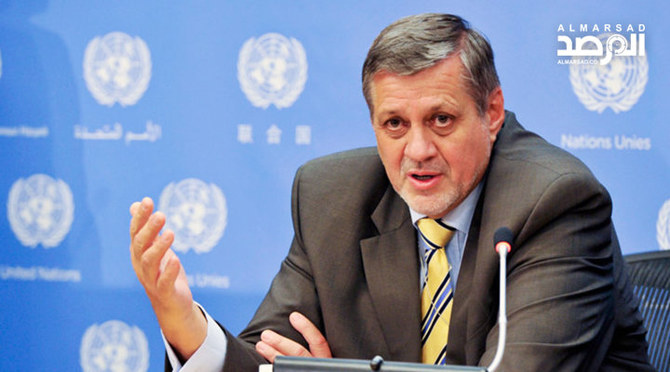
Jan Kubis, the UN’s Special Envoy for Libya
TRIPOLI, Feb 20 (NNN-AGENCIES) — As part of efforts to unite rival Libyan factions as the country prepares for national elections on Dec 24, Jan Kubis, the UN’s Special Envoy for Libya, met on Friday in Benghazi with Gen Khalifa Haftar, commander of the eastern-based Libya National Army (LNA).
The UN Support Mission in Libya said that Haftar and Kubis agreed on the importance of all parties in Libya working to ensure the elections go ahead as planned. They also discussed ways to speed up the implementation of the ceasefire agreement in the country, and the reopening of a key coastal road linking Tripoli in the west with Benghazi.
Since 2015, Libya has been split between two rival authorities: the Government of National Accord (GNA) in the west of the country, and the LNA-backed House of Representatives in the east.
On Thursday, Kubis and his team visited Tripoli to meet two members of the three-person interim Libyan Presidential Council: President-designate Mohamed Almenfi and Abdullah El-Lafi.
They discussed ways in which the UN can support the implementation of the Libyan Political Dialogue Forum’s (LPDF) political roadmap, which was agreed in Tunis in November, including the holding of an official vote of confidence in the House of Representatives.
Kubis is making his first visit to Libya since his appointment as special envoy by UN Secretary-General Antonio Guterres in January. Before that the Slovakian diplomat served as the organization’s envoy to Lebanon.
LPDF delegates met in Geneva this month to elect a transitional authority tasked with guiding the country toward the “sacred goal” of national elections in December. The selection of an interim Presidential Council and prime minister was hailed as a milestone in a political process that seeks to reunite the fractured country and end its protracted war.
Kubis also met the GNA’s minister of defense and other senior officials from the Defense Ministry, during which they discussed the security situation in the country and the implementation of the ceasefire agreement.
And during talks with the head of the electoral commission, Kubis said that the UN stands ready to provide all necessary technical support to ensure the success of the democratic process.
It remains to be seen what effects the discussions Kubis has had this week will have on progress in the efforts to deploy ceasefire monitors and encourage mercenaries and other foreign forces to leave Libya.
UN spokesman Farhan Haq said that while there is no news yet on whether foreign fighters are departing, “this is something we’re discussing with the parties on the ground.”
He added: “Mr. Kubis will continue with his work on that, just as he has been continuing to work with the various parties on the ground regarding the question of the deployment of ceasefire monitors.
“We are not yet ready to proceed with the deployment but it is something that is being taken up by the various parties and at the Joint Military (Commission).”
He said that work was continuing with all parties in Libya to prepare for the arrival of the monitors and ensure that they are able to carry out their work.
“We had the Joint Military Commission meet last week to consider the next steps about operationalizing the ceasefire agreement, including timelines,” said Haq. “And, as you know … this week Mr. Kubis is following up on that issue with the various parties on the ground.
“So, we’re trying to get the ceasefire language fleshed out and the ceasefire agreement fleshed out, and then we can have a timetable for their deployment.” — NNN-AGENCIES
